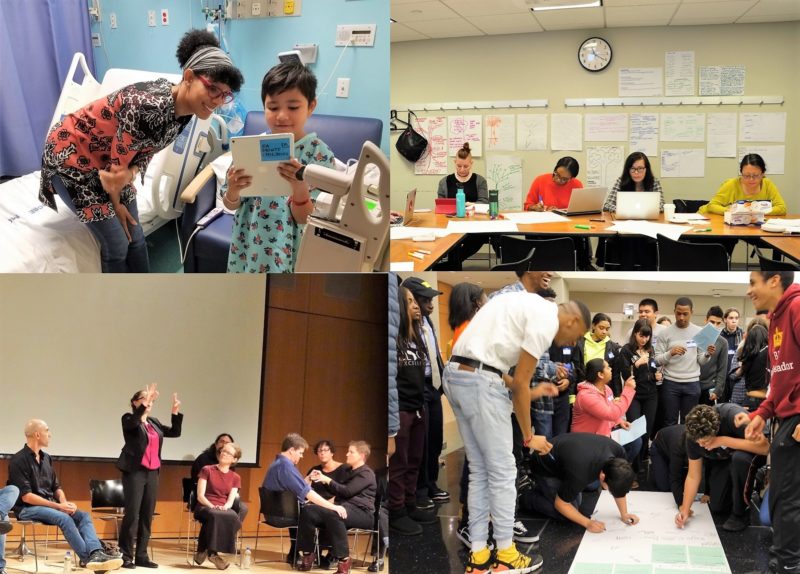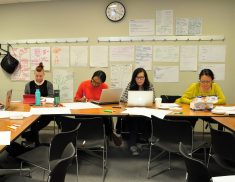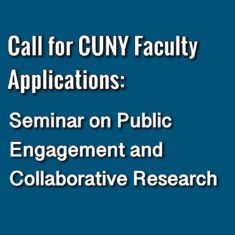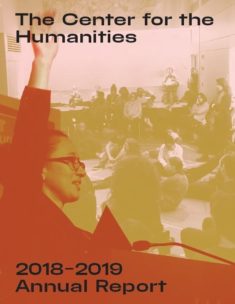About the Seminar
The Center for the Humanities is pleased to announce the third iteration of the Seminar on Public Engagement and Collaborative Research: 2020-2022, generously funded by the Andrew W. Mellon Foundation. This Seminar will support senior and community college faculty across CUNY campuses, as well as student fellows pursuing doctoral degrees at the Graduate Center, in the creation and production of new and innovative public humanities projects and pedagogy in collaboration with community partners across New York City.
The goal of the Seminar is to give faculty and students opportunities to extend their research and creative interests outside of the university. In collaboration with diverse publics, research teams develop creative and scholarly projects that address urgent social issues. Funding and logistical support provided by the Seminar allows participants to partner with cultural and civic organizations (such as non-profit organizations, literary presses, activist collectives, libraries, hospitals, museums, and performance spaces) to develop innovative humanistic work. In the past, this work has taken the form of websites, open source publications, theatrical productions, artworks and exhibitions, interactive virtual reality experiences, summits and conferences, oral history and storytelling workshops, research sprints, podcasts, and more. These serve as just a few examples of possible directions projects can take. Click to read about the guiding questions and values of the seminar.
Seminar participants not only model frameworks for public humanities at CUNY and diversify ideas of professional, intellectual, and creative development, they redefine the role of engaged scholarship and collaboratively produced knowledge in public life.
Information Session (taking place in Room 8304 at the Graduate Center, CUNY); click to RSVP:
PROPOSED RESEARCH THEMES
The Seminar will support various forms of intellectual and cultural production exploring research related to three open-ended themes. These themes are meant to serve as springboards rather than prescriptions: themes, methods, and outcomes will ultimately be designed collaboratively by participants:
- Blue Humanities: What implications does “the oceanic turn” in modernity have on colonial, imperial, and environmental humanistic scholarship? How does the social construction of the global ocean shape life on land and notions of the nation state? This research team could explore the ways in which any number of waterborne issues transform how societies perceive, construct, and manage coastal ecologies and economies. As an archipelago, New York City is fertile territory for public scholars to inquire into and act in concert with numerous communities engaged in waterfront advocacy along its historic rivers, parks, shores, and ports.
- The Humanities and Public Discourse: How can humanistic research and activities enrich public discourse on topics including education, democratic practice, and civic inclusivity? In an increasingly polarized culture, might public humanities practices and community engagement create opportunities to better understand, and thus mitigate, the personal, social, historical, and cultural conditions that prevent open, democratic conversation across difference? This group will research, analyze, and deploy strategies for transforming conflict into constructive public debate.
- Urban Neighborhoods: What role does humanistic research play in bettering urban life at the neighborhood level? How can the public humanities help preserve the uniqueness of diverse and integrated cultural and ethnic enclaves in cities increasingly homogenized by rising rent, local development, and the global real estate market? We envision this theme bringing together a diverse cohort of humanists and social scientists to activate topics ranging from immigration and sanctuary to equitable food distribution; from community control of public and green spaces to community archives and oral histories; from gentrification and displacement to public art and the production of culture; from local governance and participatory budgeting to racial, religious, and linguistic inclusivity.
CALLS FOR APPLICATIONS
Applications will open May 8th, 2019; Click here to apply and more info for the Faculty Coleader Application; and Click here to apply and more info for GC Doctoral Student Fellowships for Teaching, Digital Publics, and Provost's Public Humanities. Please check back on our website or follow our mailing list for announcements. All faculty and student fellows selected will receive training in public humanities methodologies during their first semester and financial and logistical support throughout the timeline of the project (see below for a detailed timeline). The project will support the following roles:
6 FACULTY COLEADERS: Two faculty coleaders will work within each research theme. These selected faculty will receive:
—Four course releases
—Programming budget to support project development, including funding for community partners, adjuncts, independent study students, and all logistical needs for producing public projects
THREE TEACHING FELLOWS: Teaching fellows entering their third year or higher by Fall 2020 will bring public humanities practices into their classrooms. Teaching fellows will receive:
—Tuition fellowship
—Stipends for project development
—Funds for student involvement in public humanities events
—Support from Faculty Coleaders and Center for the Humanities staff
THREE DIGITAL PUBLICS FELLOWS: Doctoral students entering their third year or higher by Fall 2020 working in digital humanities will receive:
—Tuition fellowship
—Stipend for digital platform development
—Digital Humanities training, including support to attend the Digital Humanities Summer Institute at the University of Victoria, Canada
ONE PROVOST’S FELLOW IN THE PUBLIC HUMANITIES: This fellow will work with the entire cohort as well as departments across the building to make connections and conduct research and analysis about ongoing public humanities practices at the GC. This fellow will receive:
—Tuition Fellowship
—A working space at the GC to undertake research
PROJECT TIMELINE
FALL 2019:
Information sessions (taking place in Room 9205 at the Graduate Center, CUNY): Tuesday, September 10th, 4:15-6:15pm
Tuesday, October 1st (Student Fellowship Focus),11:45am-1:45pm
September 30th: Faculty coleader applications due
October 15th: Teaching Fellow/Digital Publics Fellow/Provost’s Fellow applications due
November 4th: Faculty notifications sent out to applicants.
December 2nd: GC student fellowship notifications sent out to applicants.
SPRING 2020: project officially launches; research and project design, professional development, and public humanities training intensives for participants
FALL 2020–SPRING 2022: community engagement, public pedagogy, workshops and practicums, and development of capstone projects
SPRING 2021–SPRING 2022: reflection, analysis, and documentation of ongoing projects, resulting in digital, new media, and print interfaces that model and analyze public scholarship for a wide readership.
To learn more about past Seminar projects, click here.
Questions about this initiative can be sent to The Center for the Humanities at [email protected]
Information Session Video




